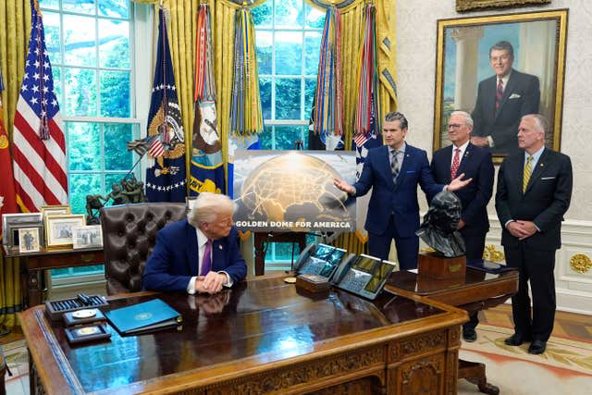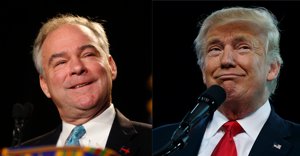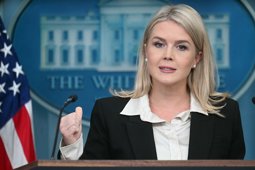
China Slams Trump’s Golden Dome Plan
China blasts Trump’s $125B Golden Dome missile defense project as a threat to space peace, while experts raise cost and tech concerns.
Beijing Condemns U.S. Missile Defense Project
China has issued a sharp rebuke of President Donald Trump’s newly unveiled Golden Dome missile defense initiative, warning that it poses a serious threat to the peaceful use of outer space and risks igniting a space arms race. The $125 billion project, described by Trump as an American version of Israel’s Iron Dome, aims to shield the U.S. from missile attacks using a combination of orbital and ground-based interceptors.
“The project will heighten the risk of turning space into a war zone,” said Chinese Foreign Minister Mao Ning on Wednesday. She criticized the plan as a violation of the Outer Space Treaty and urged the U.S. to abandon its deployment of a global anti-missile system. “China is gravely concerned about this,” she added, calling for steps to rebuild strategic trust and preserve global stability.
China’s reaction follows Trump’s announcement from the White House on Tuesday, where he projected that Golden Dome could be completed within three years. The initial $25 billion in funding has already been incorporated into the broader One Big Beautiful Bill Act currently advancing through Congress.
Senators Caught Off Guard by Scope and Cost
Many lawmakers, including members of the Senate Appropriations Defense Subcommittee, were unaware of the project’s scale. “What’s Golden Dome?” asked one senior senator, highlighting the limited briefings provided ahead of the announcement. Others voiced concerns over the lack of transparency. “I don’t support blank checks,” said Sen. John Kennedy, R-La.
Sen. Tim Sheehy, R-Mont., estimated the true cost could approach $1 trillion, far beyond the administration’s $125 billion projection. He warned that scaling up Israel’s compact Iron Dome system to U.S. dimensions poses immense technological hurdles. The Congressional Budget Office provided a preliminary cost range of $500 billion, with space-based interceptors alone accounting for up to $542 billion.
Space Force chief Gen. Chance Saltzman cautioned that early estimates often fail to capture project complexity. “We don’t always understand the full level of complexity until you’re actually in execution,” he said.
Despite financial and technological concerns, some Republicans praised the initiative’s strategic merit. “It might very well prevent a war,” said Sen. Mike Rounds, R-N.D. Others urged caution. “If we’re gonna do [Golden Dome], we do it the right way,” said Sen. Tommy Tuberville, R-Ala.
Experts Debate Strategic Shift
Defense experts suggest the project could mark a strategic turning point. Chuck DeVore of the Texas Public Policy Foundation argued that advances in space launches and electronics could reverse longstanding assumptions about cost asymmetry between offensive and defensive systems. “We’re at a truly revolutionary inflection point,” he said.
However, DeVore also warned of institutional resistance. “You’re going to see people defending the status quo,” he said. Critics may argue that funds are better spent on conventional forces like jet fighters and naval carriers.
Meanwhile, Russia’s Kremlin spokesperson Dmitry Peskov signaled that the Golden Dome proposal could rekindle discussions on arms control. He noted the absence of current treaties since the U.S. withdrawal from key agreements in 2002 and 2019, calling for a new legal foundation for strategic stability.
Amid mounting concerns over China’s space capabilities—including satellite “dogfighting” and maneuvering orbital objects—U.S. officials view the Golden Dome project as a critical countermeasure to preserve dominance in space and defend against missile threats.






